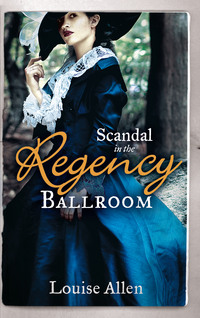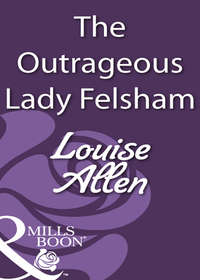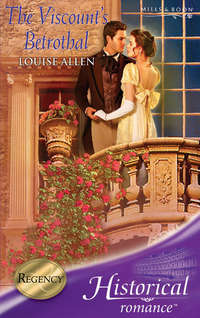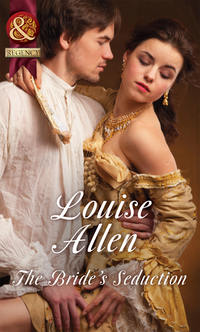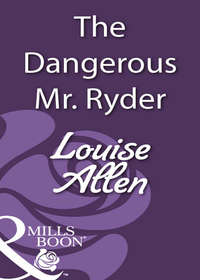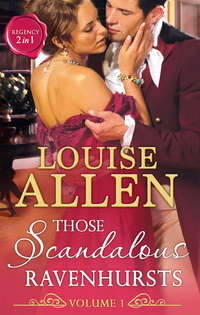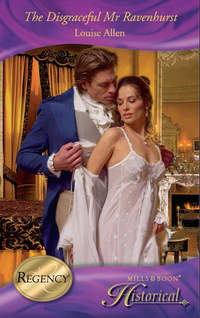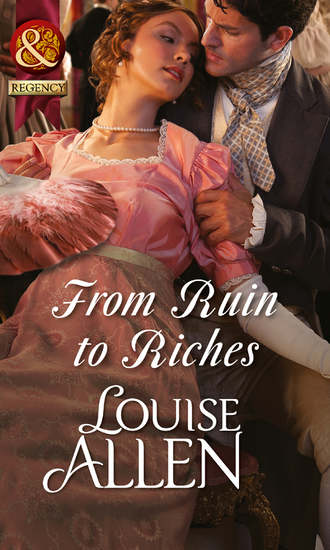
Полная версия
From Ruin to Riches
‘I have neither, sir.’ She turned her head away and the effort to steady her voice was palpable. ‘I am...somewhat adrift.’
* * *
She could not tell him the truth, Julia knew that, although the temptation to simply burst into tears, throw herself into the arms of this elderly man and pour out her story was shockingly strong. He was probably a magistrate and, even if he was not, he would be duty-bound to hand her over to the law. But she had been tramping across country, hiding in barns, spending a few coppers here and there on bread and cheese and thin ale, and she was exhausted, lost and desperate. Something of the truth would have to suffice and she must take the risk that she would prove to be a good liar.
‘I will be frank with you, sir,’ Julia said, grateful for the protection of the shadows. She wished she could see his eyes. ‘I ran away from home. Several days ago.’
‘May I ask why?’ His voice, strangely young for one advanced in years, was as studiously non-judgemental as his haggard face.
‘My cousin, on whom I am totally dependent, schemed to give me to a man who wanted only my...undoing. Running seemed the only way out, although I am just as effectively ruined as a result, I realise that now. I am sure you would not wish to entertain me under the circumstances. Your wife—’
‘I do not have one,’ he said, his voice cool. ‘And I have no objection, only a regret on your behalf, ma’am, that you find yourself in such a predicament.’
He should not be talking. Julia had no doubt that he meant exactly what he said about his health: the man was desperately ill. His body when she had supported it had felt like bones and sinew contained in skin and expensive superfine. He was tall, over six foot, and in his youth must have been well muscled and powerful. Now his breathing was ragged and his forehead under her palm had been damp with fever.
He had come to her aid when he thought she was going to cast herself into the lake and he had not insulted her when she told him a little of her disastrous misjudgement. Now the very least she could do was to assist him home and risk the slight chance that the description of a wanted murderess had reached them here. Surely she was safe for a night? The authorities could not know her name and Jonathan’s card case was with his pocketbook in her reticule—the local constable would have a nameless body to deal with, as well as a nameless fugitive.
This was no time to be scrupulous about accepting help. ‘Come, sir. If you will not allow me to go for assistance, at least take my arm. I am certain you should not be out here tiring yourself.’
‘You sound remarkably like Jervis, my valet,’ the man said with an edge of asperity. For a moment she thought stubborn pride would win out over common sense, but then he let her put her forearm under his and take a little of his weight.
‘This way, I think you said, sir?’ She made her sore feet move, trying not to limp in case he noticed and refused her help.
‘My name is William Hadfield,’ he said after a few steps. ‘Just so you know whom you are rescuing. Baron Dereham.’
She did not know the name, but then she was adrift more than a hundred miles from home and her family, although gentry, did not mix with titled society. ‘My name is—’
‘There is no need to tell me.’ He was breathing hard. Julia slowed her pace a little, glad of the excuse to do so. She was tired and sore and almost more exhausted by fear than from physical exertion.
‘It is no matter, my lord. I am Julia Prior. Miss,’ she added bleakly. Live or die, she was never going to be anything else now. And then she realised that she had given her real name. Foolish, she chided herself. But it was too late now and it was common enough.
‘Left here, Miss Prior.’ Obedient, she took the path he indicated. To her consternation the ground began to slope upwards. How was Lord Dereham going to manage this with only her feeble help? As if he read her mind he said, ‘Here is the cavalry, you need not carry me any further.’
Julia opened her mouth to protest that she was merely steadying him, then shut it again. There was enough edge in his voice for her to know the baron was not resigned to his condition and would bitterly resent any attempt to jolly him along. He must have been arrogant and self-assured in his prime, she concluded, to resent his decline so fiercely now.
‘My lord!’ Two men hurried down the slope from where a gig stood waiting. One, when he got closer, could have been identified as a valet at a glance: neat, dapper and immaculate, he was making clucking sounds under his breath. The other, in boots and frieze coat, was just as obviously a groom.
‘Jervis, help this lady into the gig.’ Her arm was released and Julia found herself being ushered into the humble vehicle as if she was a duchess and it a state coach. Behind, she could hear a low-voiced exchange that ended abruptly with a snapped command from the baron as he took the seat opposite her.
The groom went to the horse’s head and led it on, the valet followed on foot. After a few minutes passed in silence they emerged on to a great sweep of lawn and then crunched across a gravelled drive.
‘But it is a castle!’ Startled out of her circling thoughts, Julia blinked up at crenellations, a turret, arrow slits, all preposterously Gothic and romantic in the silvery light.
‘A very small one, I assure you. And disappointingly modern inside to anyone of a romantic nature. The moat is dry, the cellars full of wine bottles. The portcullis has long since rusted through and we rarely pour boiling oil on to anyone these days.’ He sounded as though he regretted that.
‘Fetch Mrs Morley to Miss Prior,’ Lord Dereham ordered as the groom helped her to descend. Her legs, she discovered as she stumbled, were almost too tired to support her. ‘Tell her to place the Chinese bedchamber at Miss Prior’s disposal and then have Cook send up a hot supper to the library.’
‘But, my lord, it must be midnight at least—’ He should not be worrying about feeding her at this hour, let alone housing her.
‘I will not have you wandering about the countryside or going to bed hungry, Miss Prior,’ he said as he climbed down, leaning on the groom in his turn. Here under the bulk of the building it was almost dark and she could not see his face at all, only judge his mood by the autocratic orders. ‘You will oblige me by spending the night and tomorrow we can see what may be done.’
He will not have it, indeed! A forceful old gentleman, the baron, whatever his health, Julia decided. But it is rather beyond his powers to find a solution to this problem. A new dawn will not make matters any better.
‘Thank you, my lord. I should not trouble you, I know, but I will not deny that your offer is most welcome.’ She had thought she could never trust another man, not after Jonathan. But the baron was advanced in years and could be no threat to her. Or her to him, provided he had no idea who he was sheltering.
‘I will see you in the library then, Miss Prior, when you are ready,’ he said behind her as she followed the valet into the hall.
* * *
‘Just down the main stairs and the door to the left, Miss Prior.’ The housekeeper stood aside as Julia murmured a word of thanks and left the warmth and comfort of the bedchamber for the shadowy panelled corridor.
The woman had shown no surprise at the state of her travel-worn clothes, although she had tutted in sympathy over the state of Julia’s feet and had produced copious hot water, linen for dressings and salves. Now, clad in some borrowed undergarments beneath her brushed and sponged walking dress, Julia felt a new surge of courage. She had heard that prisoners were more easily broken if they were kept dirty and unkempt and now she could well believe it. She had felt her strength and will ebb along with her self-respect.
The house had been decorated a few years ago, she judged as she negotiated the broad sweep of an old oak staircase. All was in good repair with an intriguing glimpse of ancient baronial castle here and there beneath the modern comfort. Yet there was an impersonal air about it as though efficient staff kept it running, but the driving force behind it, the spirit that made it a home, had vanished.
It had happened at the Grange after her father had died and she had not had the strength to simply carry on as before. It had only lasted a few weeks, then she had made herself take up the reins again. Pride, and the refusal to let her cousin and his wife find the slightest thing to criticise when they came to claim their inheritance, had dried her tears and stiffened her will. Here, with the master dying, the staff were obviously doing the best they could, which argued loyalty and efficiency.
The heavy panelled door swung open on to a room that was all warmth: a fire in the grate despite the season, crimson damask curtains at the windows, the soft glow of old waxed bookshelves. The man in the chair beside the hearth began to get to his feet as she came in and the hound at his feet sprang up, her teeth bared as she ranged herself in front of her master.
‘Down, Bess! Friend.’
‘My lord, please—there is no need to stand.’ Julia took three hasty steps across the carpet, dodged around the dog and caught the baron’s arm to press him back into the seat. She found herself breast to breast with him, the light from the fire and the candelabra on the side table full on his face.
This was the man from the lakeside? The man she had held in her arms, the one she thought elderly and harmless? ‘Oh!’ She found herself transfixed by amber eyes, the eyes of a predator, and blurted out the first thing that came into her head. ‘How old are you?’
Chapter Three
Lord Dereham sat down as she released his arm. His breathless laugh was wicked. ‘I am twenty-seven, Miss Prior.’
‘I cannot apologise enough.’ Cheeks burning with mortification, Julia took a hasty step backwards, tripped over the dog and found herself sprawling into the chair opposite his. ‘I am so sorry, I have no idea why I should blurt out such a impertinent question, only—’
‘Only you thought I was an old man?’ Lord Dereham did not appear offended. Perhaps in his currently restricted life the sight of a lady—female, she reminded herself—behaving with such appalling gaucheness and lack of elegance was entertainment enough to distract him from her outrageous lack of manners.
‘Yes,’ she confessed and found she could not look him in the face. Those eyes. And he might be thin and ill, but he was unmistakably, disturbingly, male for all that. She bent to offer an apologetic caress to the elderly hound who was sitting virtually on her feet, staring at her with a reproachful brown gaze.
‘Miss Prior.’ She made herself lift her eyes. ‘You are quite safe with me, you know.’
Her head agreed with him. Every feminine instinct she possessed, did not. ‘Of course, I realise that. Absolutely,’ Julia said, in haste to reassure herself. Her voice trailed away as she heard her own tactless words and saw his face tighten.
He had been a handsome man once. He was striking still, but now the skin was stretched over bones that were the only strong thing left to him, except his will-power. And that, she sensed, was prodigious. His hair was dark, dulled with ill health, but not yet touched with grey. He had high cheekbones, a strong jaw, broad forehead. But his eyes were what held her, full of life and passionate, furious anger at the fate that had reduced him to this. Were they brandy-coloured or was it dark amber?
Julia could feel she was blushing as they narrowed, focused on her face. ‘I mean, I know I am safe because you are a gentleman.’ Safe from another assault, not safe from the long arm of the law. Not safe from the gallows.
She sat up straight, took a steadying breath and looked fixedly at his left ear. Such a nice, safe part of the male anatomy. ‘You are being remarkably patient with me, my lord. I am not usually so...inept.’
‘I imagine you are not usually exhausted, distressed and fearful, nor suffering the emotional effects of betrayal by those who should have protected you, Miss Prior. I hope you will feel a little better when you have had something to eat.’ He reached out a thin white hand and tugged the bell pull. The door opened almost immediately to admit a pair of footmen. Small tables were placed in front of them, laden trays set down, wine was poured, napkins shaken out and draped and then, as rapidly as they had entered, the men left.
‘You have a very efficient staff, my lord.’ The aroma of chicken broth curled up to caress her nostrils. Ambrosia. Julia picked up her spoon and made herself sip delicately at it instead of lifting the bowl and draining it as her empty stomach demanded.
‘Indeed.’ He had not touched the cutlery in front of him.
She finished the soup along with the warm buttered roll and the delicate slices of chicken that had been poached in the broth. When she looked at Lord Dereham he had broken his roll and was eating, perhaps a quarter of it, before he pushed the plate away.
‘And a very good cook.’
He answered her concern, not her words. ‘I have no appetite.’
‘How long?’ she ventured. ‘How long have you been sick like this?’
‘Seven—no, it is eight months now,’ he answered her quite readily, those remarkable amber eyes turned to watch the leaping flames. Perhaps it was a relief to talk to someone who spoke frankly and did not hedge about pretending there was nothing wrong with him. ‘There was a blizzard at night and Bess here was lost in it. One of the young underkeepers thought it was his fault and went out to look for her. By the time we realised he was missing and I found them both we were all three in a pretty poor state.’
He grimaced, dismissing what she guessed must have been an appalling search. And he had gone out himself, she noted, not left it to his keepers and grooms to risk themselves for a youth and a dog. ‘After four years in the army I thought I was immune to cold and wet, but I came down with what seemed simply pneumonia. I started to cough blood. Then, although the infection seemed to go, I was still exhausted. It became worse. Now I can’t sleep, my strength is failing. I have no appetite, and there are night-fevers. The doctors say it is phthisis and that there is no cure.’
‘That is consumption, is it not?’ As he had said, a death sentence. ‘I expect the doctors think saying it in Greek makes them seem more knowledgeable. Or perhaps it justifies a higher bill.’
‘You have no great love of the medical profession?’
How elegant his hands were with the long bones and tendons. The heavy signet on his left ring finger was so loose that the seal had slipped round. ‘No,’ Julia admitted. ‘I have not. No great faith, would perhaps be truer.’ The doctors had done little enough for Papa, for all their certainties.
‘You seem to understand that speaking about problems is a relief after everyone pretending there is nothing wrong.’ He looked away from the fire and into her eyes and for a moment she thought the flames still danced in that intent gaze.
Jonathan’s beautiful blue gaze was always impenetrable, as though it was stained glass she was looking at. This man’s eyes were windows into his soul and a very unpleasant place it seemed to be, she thought with a shiver at her Gothic imaginings.
‘Would it help to confide your story in a total stranger? One who will take it to—’ He broke off. ‘One who will respect your confidence.’
Take it to the grave. He was no priest bound to silence, she could hardly confess to her actions and expect him to keep the secret, but perhaps talking would help her find some solution to the problem of what she could possibly do now.
‘My father was a gentleman farmer,’ Julia began. She sat back in the chair and found she could at least begin as though she was telling a story from a book. The hound circled on the hearth rug, sighed and lay down with her head on her master’s foot as if she, too, was settling to listen to the tale. ‘My mother died when I was fifteen and I have no brothers or sisters, so I became my father’s companion: I think he forgot most of the time that I was a girl. I learned everything he could teach me about the estate, the farm, even purchasing stock and selling produce.
‘Then, four years ago, he suffered a stroke. At first there was talk of employing a steward, but Papa realised that I could do the job just as well—and that I loved the place in a way that an employee never would. So I took over. I thought there was no reason why we could not go on like that for years, but last spring he died, quite suddenly in his sleep, and my Cousin Arthur inherited.’
She would not cry, she had got past that. Just as long as the baron did not try to sympathise: she could not cope with sympathy. Instead he said, ‘And there was no young man to carry you off?’
‘I had been too busy being a farmer to flirt with young men.’ He had seen, and heard, enough of her now to understand the other reasons no-one had come courting. She was hardly a beauty. She was too tall. And too assertive, too outspoken. Unladylike hoyden, Cousin Jane called her. A managing, gawky blue-stocking female with no dowry, that was what Jonathan had flung at her. He was obviously correct about her lack of attraction—it was quite clear in retrospect that she had been a complete failure in his bed.
‘My cousins allowed me to stay because I had nowhere else to go, but it was unsuitable for me to take any interest in the estate, they said, and besides, they made it very clear that it was no longer any of my business. Cousin Jane found me useful as a companion,’ she added, hearing the flatness in her own voice. A drudge, a dogsbody, the poor relation kept under their roof to make them appear charitable.
‘But then it changed?’
‘They must have grown tired of supporting me, I suppose. Of the cost, however modest, and tired too of my interference in estate matters. There was a man—I think they intended to make it worth his while to take me off their hands. He did not offer marriage.’
* * *
A squalid story, Will thought as Miss Prior ran out of words. Those lips, made for smiles, were tight, and she had coloured painfully. It was unwise of her to flee her home, but the alternative seemed appalling and few unprotected young women would have had the resolution to act as she had done. ‘You ran away, eventually found yourself in my parkland and the rest we know,’ he finished for her.
‘Yes.’ She sat up straight in the chair as if perfect deportment could somehow restore her to respectability.
‘What is their name? Someone needs to deal with your cousin. Even if he had not been in a position of trust, his behaviour was outrageous.’
‘No! Not violence...’ He saw her bite her lip at the muttered curse that escaped him. She had gone quite pale.
‘No, of course not. You need have no fear that I might call him out. I forget sometimes that my fighting days are over.’ Damn. And he hadn’t meant to say that, either. Self-pity was the devil. ‘I am not without influence. It would be my pleasure to make his life hell in other ways than by threatening him at swordpoint. Is his name Prior? Where is your home?’
She shook her head in silent refusal to confide. Will studied the composed, withdrawn, face in the firelight. He had never met a woman like her. Even in this state she seemed to have the self-possession of someone older, an established matron, not a girl of perhaps twenty-two or three.
In the candlelight her skin was not fashionably pale, but lightly coloured by the sun. Her hands, clasped loosely in her lap, were like her whole body—strong and graceful with the physical confidence that came from fitness and exercise. She moved, her cuff pulled back and he saw bruises on her wrist, black and purple and ugly. That a woman should be under his protection and yet he could not avenge such treatment was shameful. No, she must not go back to that, he could do that for her at least.
‘I hope your father did not know that his heir would wilfully ignore the expertise you could have shared with him,’ he said at last when a log broke in the grate, sending up a shower of sparks and jerking him back from his bitter reverie. ‘I know all too well the character of my own heir, my cousin Henry. He’ll squander away the lifeblood of the estate within a year or two—that’s all it took him to lose what was not tied down of his own inheritance.’
‘You are estranged from him?’ Miss Prior’s face was expressive when she allowed it to be. Now the little frown between the strongly marked dark brows showed concern. She was too tall, no beauty. One would almost say she was plain, except for the regularity of her features and the clarity of her gaze. And the generous curve of lips that hinted at a sensuality she was probably unaware of.
Will felt a frisson of awareness run through him, just as he had when she had held him in her arms on the bridge, and cursed mentally. He did not need something else to torture him and certainly not for his body to decide it was interested in women again. If he could not make love with the stamina and finesse that had caused his name to be whispered admiringly amongst certain ladies, then he was not going to settle for second best.
A wife, he had realised, was out of the question. He had known he must release Caroline from their betrothal, but it had shocked him, a little, how eagerly she had snatched at the offer amidst tearful protestations that she was not strong enough to witness his suffering. She was a mass of sensibility and high-strung nerves and he had found her delicate beauty, her total reliance on his masculine strength, charming enough to have talked himself half into love with her. To have expected strength of will, and the courage to face a husband’s lingering death, was to have expected too much.
Miss Prior was waiting patiently for him to answer her question, he realised. Will jerked his wandering thoughts back. ‘Estranged? No, Henry’s all right deep down. He’s not vicious, just very immature and spoilt rotten by his mama. If he wasn’t about to inherit this estate I’d watch his antics with interested amusement. As it is, I’d do just about anything to stop him getting his hands on it for a few years until he grows up and learns to take some responsibility.’
‘But you cannot afford to do that, of course.’ Miss Prior had relaxed back into the deep wing chair. Another five minutes and she would be yawning. He was selfish to keep her here talking when she should be asleep, but the comfort of company and the release of talking to this total stranger was too much to resist.
‘No. I cannot.’ I cannot save the only thing left to me that I can love, the only thing that needs me. My entire world. There must be a way. In the army before he had inherited, and in the time he had been master of King’s Acre, he had relied both on physical prowess and his intellect to deal with problems. Now he had only his brain. Will tugged the bell pull. ‘Go to bed, Miss Prior. Things will look better in the morning.’
‘Will they?’ She got to her feet as the footman came in.
‘Sometimes they do.’ It was important to believe that. Important to believe that he would think of something to get King’s Acre out of this coil, important to hope that the doctors were wrong and that he had more time. If he could only make time, stretch it...
‘Goodnight, my lord.’ She did not respond to his assertion and he rather thought there was pity in those grey eyes as she smiled and followed James out of the room.
The ghost of an idea stirred as he watched the straight back, heard the pleasant, assured manner with which she spoke to the footman before the door closed. A competent, intelligent, brave lady. Will let his head fall back, closed his eyes and followed the vague thought. Stretch time? Perhaps there was a way after all. Unless he was simply giving himself false hope.
* * *
Do things look better in the morning light? Julia sat up in the big bed, curled her arms around her raised knees and watched the sunlight on the tree tops through the bay window that dominated the bedchamber.


